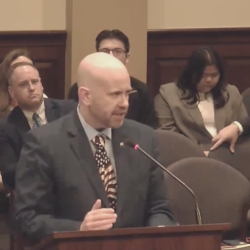This editorial against eliminating the sales tax on groceries was submitted by Carlos Vidales, a Republican precinct committeeman in Ada County. Click here to read the counterpoint.
No, Idaho should not repeal the grocery tax. Idaho should repeal the grocery tax credit, apply sales tax to all sales of good and services–no exemptions–and reduce the State sales tax rate as much as possible. Then also eliminate all state income taxes.
Here is why:
The only just tax is that tax than burdens the individual in proportion to the government services he receives. Since it is usually impossible to attribute to each individual what part of the cost of government services he has received, a different metric must be identified.
Regarding income taxes: The production of wealth rarely, if ever, burdens governments or individuals. It is always the government who burdens the creation of wealth with regulations and taxes. Some regulations are necessary and must continue–licenses to practice medicine or law come to mind–but taxes on income are blatant theft. We tax income because too many voters covet what others earn and send the government bully to confiscate some of those earnings.
We should not discourage wealth production by taxing it. Taxing what people produce is counterproductive, even immoral. Someone who earns $100K/yr can certainly “afford” to pay more taxes than someone who earns $50K/year, but you can also bet (in the general case at least) that the person earning $100K works harder and/or smarter than the person earning $50K. People truly earn the income they work for.
Since taxes are still needed to support government functions: police, fire, courts, etc., how do we pay for those necessary services in a way that burdens beneficiaries (taxpayers) in proportion to their need and use of government services, and–just to be fair–in proportion to their means to pay for those services? A simple answer is to tax them in proportion to their propensity to consume.
A flat sales tax and all commercial exchanges, all purchases and all services what-so-ever, is by far the fairest tax of all. Businesses and people who sell more of whatever it is that they produce, would always produce for the government sales taxes in exact proportion to the value of the goods and services they sell. And the people paying those taxes will pay in exact proportion to their consumption. What can possibly be more fair than that?
“But,” you may say, “people with lower income have to feed themselves. Exempting groceries from sales taxes is the charitable thing to do!” Yes, we all have to feed ourselves, but we still make free choices. The person earning $100K may have a large family to support and will purchase hamburger, while the person making $50K may be single by choice, and buying tenderloin. Let sales taxes apply equally across the board and whoever chooses to buy tenderloin will surely pay more sales tax than someone purchasing hamburger.
Here are a few outstanding advantages of flat sales taxes:
1) Everyone pays in proportion to his propensity to consume. Everyone pays a “fair” share, no one is exempted, everyone helps support the burden of financing the government according to their means and consumption choices. Low income individuals and families naturally consume less, and they will pay less taxes, but will still contribute to financing government functions; high income individuals and families will pay more because they normally and naturally consume more.
2) If government spending rises, sales tax rates will have to increase to finance the new spending, and everyone will still pay in proportion to his propensity to consume. No more constituencies fighting to be exempted from tax increases, no more sacred cows that “must be spared.” Everyone has a dog in the fight and if you vote to increase sales tax rates, you cannot exempt yourself from the tax increase because you would be voting to increase your own taxes.
3) Economic downturns will normally reduce any income or sales tax revenues that governments may depend on. But that losing those income taxes has usually been a much more disruptive event to governments. Depending on a universal sales tax on all goods and services is very likely to limit the impact on governments– because people must still consume, particularly groceries, when unemployed. With an universal sales tax, people will still produce at least some revenue to finance the government. Before you object by saying that an unemployed person cannot afford sales taxes, please consider how an unemployed person can afford anything at all. A person living paycheck to paycheck will always have serious problems making ends meet, but a well structured and implemented sales tax should not be a burden so significant to an unemployed person that he “cannot afford” to pay it.
So… no, do not repeal the sales tax on groceries. Repeal the grocery tax credit and apply sales taxes to the sale of all goods and services, so that the sales tax rate can be minimized, and so all persons benefiting from government services always pay their fair share of the expense.
About Staff Writer
The Gem State Chronicle brings you news and analysis that empowers you to make positive change in Idaho. Established 2022.













